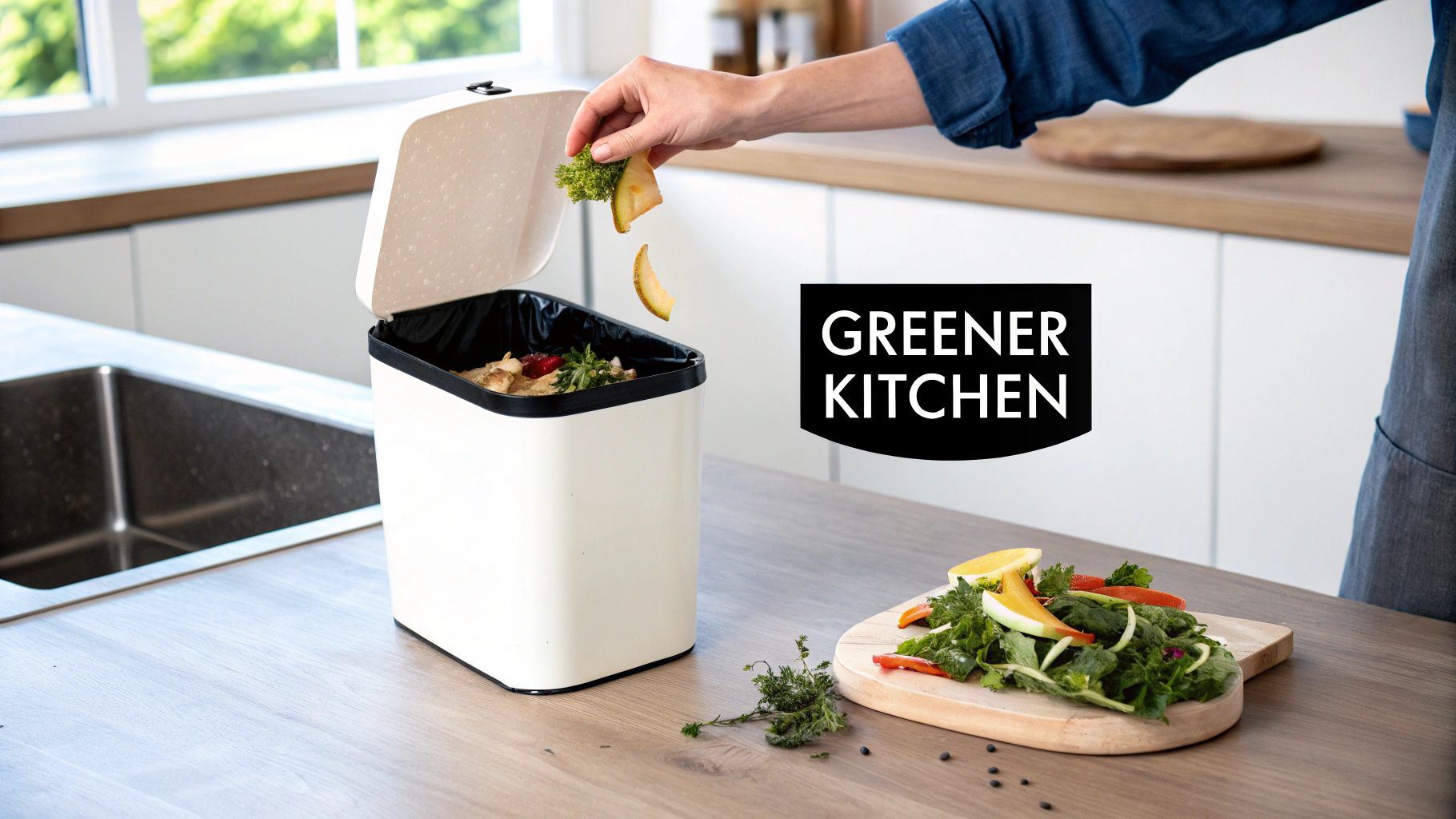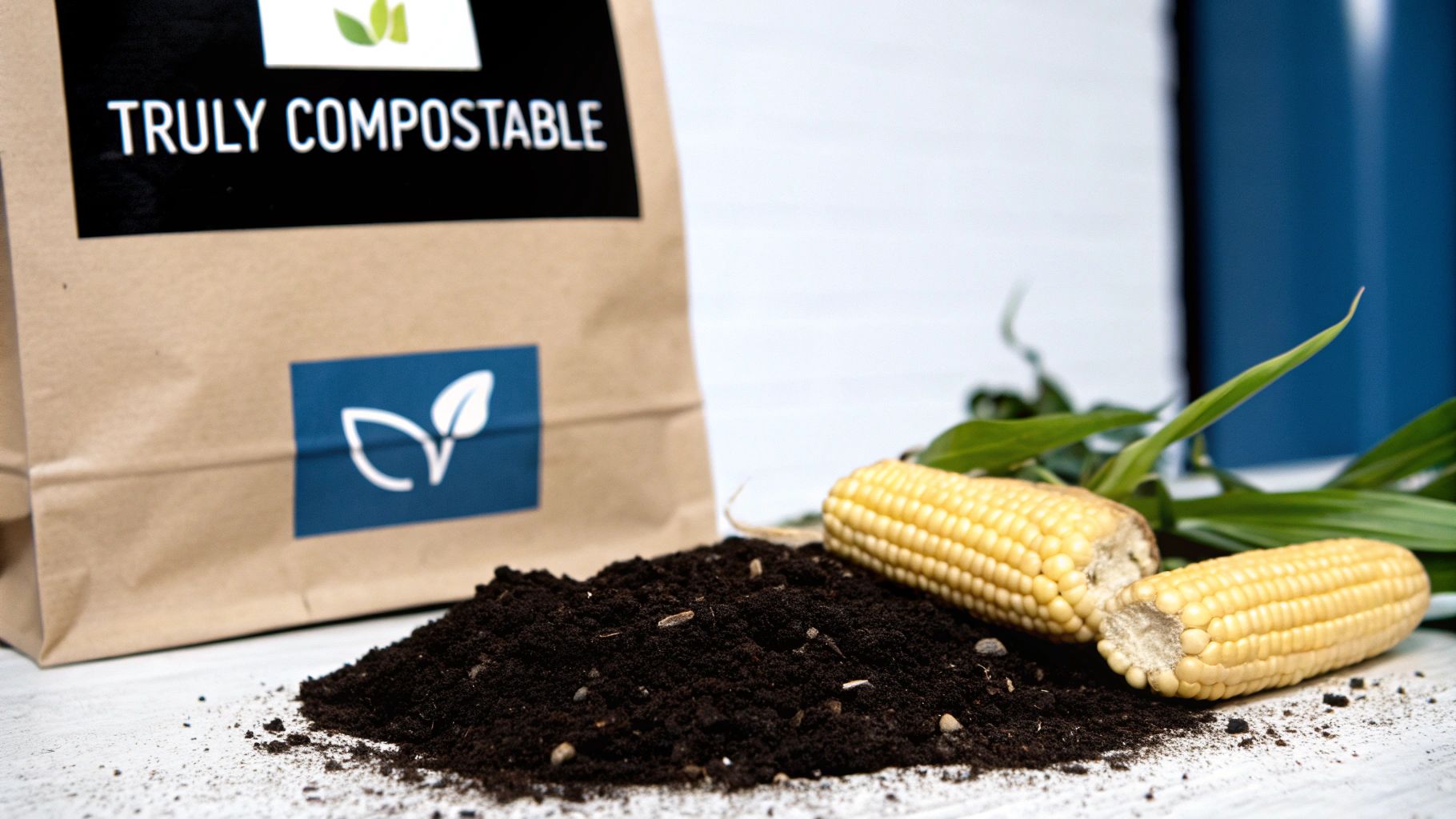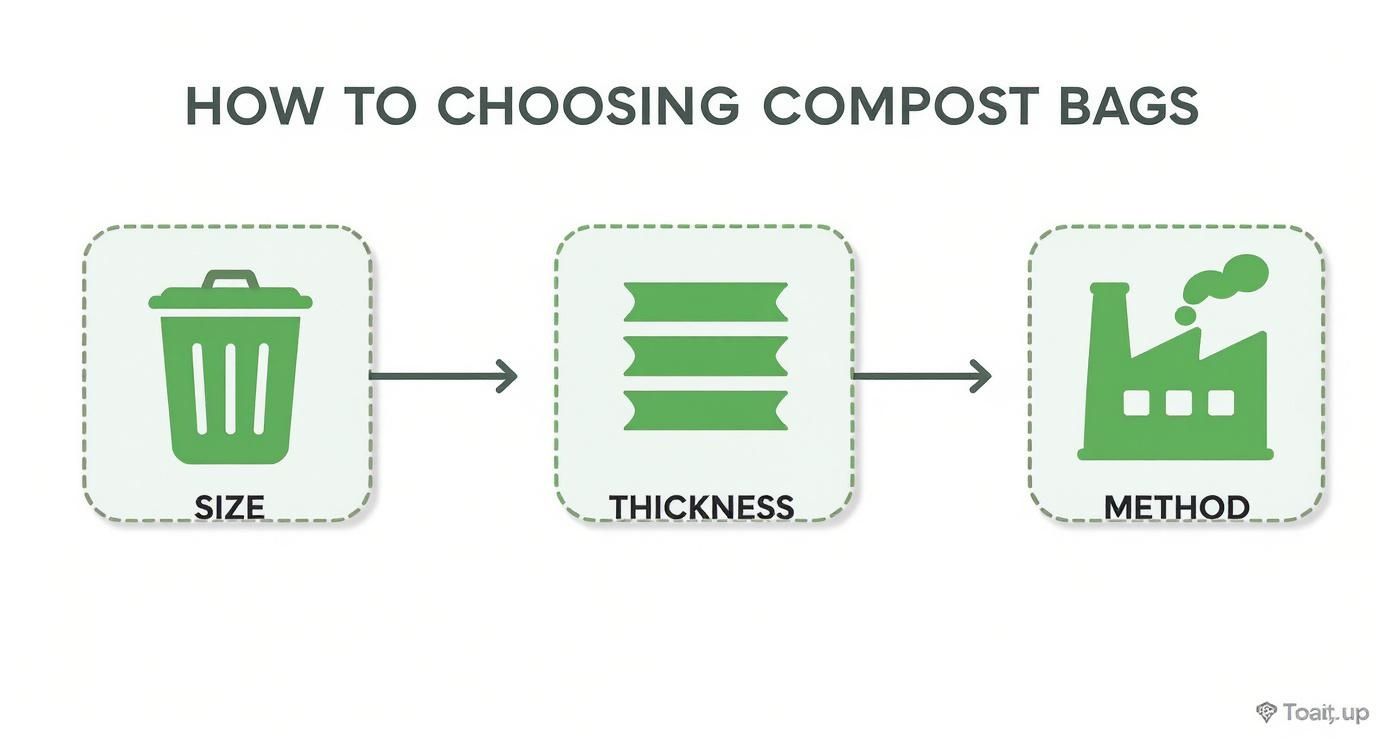
Your Simple Guide to Compost Waste Bags: A Small Change with a Huge Impact
Share
Imagine this: you're clearing your kitchen scraps, but instead of that familiar pang of plastic-related guilt, you feel a sense of purpose. That's the powerful promise of compost waste bags. This isn't just another eco-friendly trend; it's a decisive, hands-on choice to combat landfill waste, slash greenhouse gas emissions, and actively heal our planet.
This guide will show you how one simple swap can transform your daily routine into a powerful act of environmental stewardship.
The Easiest Step You Can Take for a Greener Kitchen

Let's be clear: switching to compostable bags is one of the most immediate and impactful changes you can make, starting today. It directly confronts the colossal problem of organic waste rotting in landfills. When your food scraps are entombed in plastic and buried without oxygen, they release methane—a greenhouse gas with devastating warming potential.
By choosing compost waste bags, you're not just buying a different bin liner; you are becoming an essential part of a restorative, circular system. Instead of your waste taking a one-way trip to a polluting landfill, it is reborn as nutrient-rich soil. This small action has profound consequences, supporting a healthier ecosystem from the ground up.
Why This Small Change Matters More Than Ever
The global movement to eliminate landfill waste is gaining unstoppable momentum. As cities and communities implement ambitious composting programs and get serious about waste diversion, the demand for reliable compostable products has exploded.
The proof is in the numbers. The global market for compostable refuse bags is projected to reach an incredible $756.3 million by 2035. This isn't just a market trend; it's a testament to a collective global commitment to managing our waste responsibly. You can discover more about these market trends on futuremarketinsights.com.
Adopting compostable bags empowers you to join this positive movement effortlessly. It transforms a mundane chore—tossing out coffee grounds and vegetable peels—into a tangible contribution to the planet's health.
The benefits are undeniable and powerful:
- Slash Your Landfill Contribution: By diverting organic waste, you directly reduce the amount of trash piling up and prevent the release of harmful greenhouse gases.
- Create a Precious Resource: Your scraps are transformed into valuable compost that revitalizes gardens, farms, and local parks.
- Simplify Your Life: These bags are engineered to keep your kitchen compost caddy clean and make transferring scraps to your main bin a mess-free process.
Making this one switch empowers you to be a part of the solution, one bag at a time.
What Makes a Bag Truly Compostable?

The world of "green" products can be a minefield of misleading claims. You've seen the words: 'biodegradable,' 'degradable,' 'eco-friendly.' They are not the same as 'compostable.' The distinction is critical, and it comes down to a simple, powerful idea.
Think of a certified compost waste bag as you would an apple core. When you're done, you can toss it into a compost pile where it completely breaks down, returning to the earth and becoming part of the rich, healthy soil. It vanishes without a trace.
In stark contrast, most 'degradable' bags are a trap. They're often just conventional plastic with additives that cause them to fragment into countless tiny microplastics. They don't disappear; they just become a permanent, toxic pollutant in our soil and water for centuries.
The Science of Returning to Nature
So, what's the secret behind a genuinely compostable bag? It’s not magic; it’s science rooted in nature. Instead of petroleum, these bags are made from plant-based materials.
The primary ingredient is a bioplastic called Polylactic Acid (PLA), derived from renewable resources like corn starch or sugarcane. This is the game-changer. Because it originates from plants, the microorganisms in a compost pile recognize it as food. They work tirelessly, breaking the bag down into three simple, harmless elements:
- Water (H₂O)
- Carbon Dioxide (CO₂)
- Biomass (the good stuff—nutrient-rich compost!)
The process leaves zero toxic residue. If you're curious about the specifics, you can dive deeper into what compostable bags are made of. For a broader look at sustainable innovation, it's worth exploring the best eco-friendly materials for packaging.
Your Shield Against Greenwashing
How do you guarantee you’re getting the real deal and not a cleverly disguised piece of plastic? Demand certification. It is your non-negotiable defense against "greenwashing," providing undeniable proof that a product performs as promised.
The gold standard in North America is the Biodegradable Products Institute (BPI). They rigorously test products against the scientific standard ASTM D6400. A bag bearing the BPI logo is certified to break down completely and safely in a commercial composting facility.
Without that seal, you’re relying on faith, not fact. This is precisely why municipal composting programs mandate BPI-certified bags—it’s their guarantee of creating clean, uncontaminated compost. When you see that logo, you can be absolutely confident you’ve chosen a product designed to complete its natural cycle and return to the earth.
The Real-World Benefits of Making the Switch
Choosing compost waste bags is more than a small household change; it’s an action that creates a powerful ripple effect far beyond your kitchen. Think of it not as swapping one product for another, but as wielding a tool to build a healthier planet, starting right where you live.
The most immediate reward is a cleaner, odor-free kitchen. These bags are engineered to contain wet, messy food scraps, eliminating foul smells and the gross liquid that can pool in your compost caddy. It makes the entire process cleaner, simpler, and more pleasant.
But the true transformation happens after the bag leaves your home. With every bag you compost, you are rescuing valuable organic material from the landfill. This is a monumental act—food scraps and yard trimmings constitute over 30% of what we throw away.
Protecting Our Planet from Dangerous Gases
When that mountain of organic waste is buried in a landfill, it decomposes without oxygen. This anaerobic process unleashes methane, a greenhouse gas over 25 times more potent than carbon dioxide at trapping heat in our atmosphere. Composting elegantly sidesteps this entire climate catastrophe.
By choosing to compost, you are taking direct, personal action against climate change. You are not just disposing of waste; you are actively preventing the creation of a dangerous greenhouse gas, contributing to cleaner air and a more stable climate for everyone.
It's a powerful way to turn an environmental liability into a potent solution.
Creating Healthier Soil for a Thriving Community
The ultimate reward is the creation of rich, nutrient-dense compost. Using a certified compost waste bag is absolutely critical to ensuring this compost is pure and beneficial. Regular plastic bags shred into microplastics, poisoning the soil for generations. Certified bags, however, break down completely alongside the food scraps.
This clean, high-quality compost is black gold for our earth.
- It enriches gardens and farms: Acting as a natural fertilizer, it rebuilds soil structure and gives plants the essential nutrients they need to flourish.
- It conserves water: Soil fortified with compost retains moisture far more effectively, drastically reducing the need for irrigation in gardens and on farms.
- It supports local ecosystems: Revitalizing soil in parks and public spaces with compost helps create healthier, more resilient natural environments right in your community.
Ultimately, by using the right bag, you are not merely avoiding contamination; you are helping to create an invaluable resource. Your food scraps are returned to the earth, closing the loop and building a regenerative system that benefits all of us.
How to Choose the Right Compost Waste Bags
Ready to make a change? Selecting the right compost waste bags is straightforward, but a few key details will elevate your experience from good to great. Think of it as choosing the perfect tool for a vital job—the right bag makes composting effortless and effective.
Start with Size and Strength
First, let's talk size. A small, 3-gallon bag is perfectly suited for a countertop kitchen caddy for daily food scraps. For larger bins in a garage or outdoors, you'll need a bigger, more robust bag to handle the increased volume and weight.
Next, consider thickness, measured in mils. This tells you how durable the bag is and how well it resists leaks. While a thinner bag might work for dry items like coffee grounds, for wet and heavy food waste, a thicker bag of 0.6 mils or more is a smart investment. It’s your best defense against rips, tears, and drips.
Match the Bag to Your Composting Method
Where your compost goes is critically important. Your composting method—be it a municipal service or a backyard pile—determines exactly which type of bag you must use.
It all comes down to the environment where your bag will break down.
- Industrial Composting: These large-scale facilities operate at high, sustained temperatures to decompose waste rapidly. If you use a curbside collection service, you must choose bags with BPI certification (meeting the ASTM D6400 standard).
- Home Composting: Your backyard pile has much lower, fluctuating temperatures. For this, you absolutely need bags specifically certified for "home compost," such as those meeting the TUV Austria OK compost HOME standard. These are engineered to break down in cooler, less consistent conditions.
Using the wrong bag will contaminate the compost. To understand why this is so critical, see our guide on whether all compostable bags are truly compostable in our detailed guide.
This quick comparison will help you select the perfect bag for your needs.
Compost Bag Feature Comparison
| Feature | What to Look For | Best For |
|---|---|---|
| Size | 3-gallon for kitchen caddies, 13+ gallons for larger bins. | Matching the bag to your bin to avoid over-stuffing or waste. |
| Thickness | 0.6 mils or higher for wet food scraps. | Preventing leaks and tears, especially with heavy or wet waste. |
| Certification | BPI (ASTM D6400) for industrial, OK compost HOME for backyard. | Ensuring the bag breaks down properly in your specific compost environment. |
| Closure Type | Drawstring or tie-handles for convenience. | Easy and secure closing to contain odors and prevent spills. |
Choosing correctly from the start guarantees your composting journey will be clean, simple, and impactful.
The demand for these bags is not just growing; it's exploding, signaling a profound shift in our collective consciousness about waste. The global market for compostable garbage bags is projected to exceed $2.8 billion by 2033. This isn't a fleeting trend; it is proof that individual choices are fueling a worldwide movement toward smarter, sustainable solutions. Discover more insights about these market projections on marketreportanalytics.com.
Yes, compostable bags cost slightly more than conventional plastic. Consider it an investment—in a cleaner kitchen, healthier soil, and a planet free from plastic pollution. When you choose the right bag, you ensure your effort yields the greatest possible positive impact.
Using and Storing Your Bags for Maximum Success
To unlock the full potential of your compost waste bags, a few simple habits are all it takes. These are not inert plastic; they are made from "living" plant-based materials designed to decompose. Handling them correctly ensures they do their job in the compost pile—not prematurely in your kitchen.
One common sign of a high-quality bag is condensation, or "sweating." This is perfectly normal! It means your food scraps are releasing moisture and the bag is breathing, which is essential for the composting process. However, this moisture will naturally weaken the bag over time.
The simple solution? Change your compost bag every 3-4 days. This disciplined routine prevents the bag from beginning to break down too early, guaranteeing a clean and mess-free trip to your main compost bin.
This visual guide can help you find the right bag for your needs, factoring in everything from size to your composting method.

Ultimately, aligning your choice of bag with your household's habits is the key to preventing frustrating leaks and making your entire composting system run smoothly.
Pro Tips for Flawless Handling and Storage
Beyond changing the bag regularly, a few best practices will make a world of difference, keeping your bags strong from the roll to the bin.
- Line Your Bin: Place a single paper towel at the bottom of your pail to absorb excess moisture and provide an extra layer of protection.
- Avoid Sharp Objects: Be mindful when tossing in sharp items like eggshells or bones that could puncture the bag.
- Don't Overfill: Stuffing a bag to its limit puts immense stress on the seams and greatly increases the risk of it tearing when you lift it out.
Proper storage is just as vital as proper use. Keep your roll of bags in a cool, dark, and dry place, like under the sink or in a pantry. Heat, direct sunlight, and humidity can activate the decomposition process prematurely, leaving you with a compromised roll of bags.
Following these simple tips will help you build a seamless and effective composting routine. For more advice on getting your whole system up and running, check out our guide on how to compost at home.
Your Small Change, Your Lasting Impact
https://www.youtube.com/embed/oFlsjRXbnSk
Switching to compost waste bags may seem like a minor adjustment to your daily life, but its impact is monumental. It is a conscious decision to participate in a positive, regenerative cycle that benefits your garden, your community, and the entire planet.
Every single time you put your food scraps into one of these bags, you are taking a direct stand against a critical environmental threat. You are keeping organic waste out of landfills, preventing the release of methane, a potent greenhouse gas. Instead of creating pollution, you are helping to create life-giving soil.
You Are Part of a Growing Global Movement
This simple swap in your kitchen connects you to a much larger story. The demand for compostable bags is surging, with the market projected to hit $430 million by 2032. That's more than a statistic; it represents a powerful, collective awakening toward more intelligent, sustainable living.
You now have the knowledge to be part of the solution. This isn't just about diverting waste; it's about creating value from what we once threw away. It’s about building a more sustainable future, one bag at a time.
This single habit can be a catalyst for even greater change. You can expand your impact by exploring broader strategies for reducing food waste.
What's next? Your next step is simple yet profound. Find your local composting guidelines, and make your first purchase with the confidence that you are making an informed, impactful choice. By putting this knowledge into action, you are doing more than just tidying your kitchen—you are actively healing our planet.
Got Questions? We've Got Answers
Embarking on a new journey naturally brings questions. To ensure you feel completely confident, we’ve answered some of the most common queries about compost waste bags.
How Long Do These Bags Actually Take to Break Down?
The honest answer is: it depends entirely on the environment. Think of an apple core—it will disappear much faster in a hot, active compost pile than if left on the sidewalk.
In an industrial composting facility, with its high heat and optimized conditions, a certified bag can fully decompose in 90 to 180 days. In your backyard compost bin, where temperatures are cooler and fluctuate, the process will take longer, typically 6 to 12 months.
This is precisely why reading the certification label is non-negotiable. If you home compost, you must buy bags specifically certified for "home composting" to ensure they break down properly in your setup.
Can I Just Toss Compostable Bags in the Trash or Recycling?
This is a critical point, and the answer is an emphatic no. You must never put compostable bags in your recycling bin. They are made from completely different materials than plastic bottles and will contaminate the entire recycling stream, creating major problems at processing facilities.
As for the regular trash, that’s not the right place either. Landfills are sealed environments, starved of oxygen. Without air, the composting process cannot occur. Instead of breaking down, your bag and its contents will likely sit mummified for years, defeating the entire purpose of your effort.
A compost waste bag belongs in only two places: an approved municipal composting program or a well-managed home compost pile. These are the environments where the magic happens, allowing them to fully return to the earth as healthy soil.
What’s the Big Deal if I Use a Regular Plastic Bag for My Food Scraps?
Using a regular plastic bag for compost is a catastrophic mistake for any composting system. That plastic bag will persist for hundreds of years.
Worse still, the machinery at composting facilities will shred it into millions of tiny plastic fragments—microplastics. These toxic particles contaminate the finished compost, which is then spread on gardens, farms, and public parks. It creates a direct pathway for plastic pollution to enter our food chain and ecosystems.
This contamination is so severe that most composting facilities will reject any collection that arrives in a standard plastic bag. This is why your choice of bag is paramount. You are the guardian of the system, ensuring the final compost is clean, safe, and truly beneficial for the planet.
Ready to make a simple change that delivers a powerful impact? terravera offers premium, certified compost waste bags that make composting clean, easy, and highly effective. Start building a healthier planet, right from your own kitchen.
